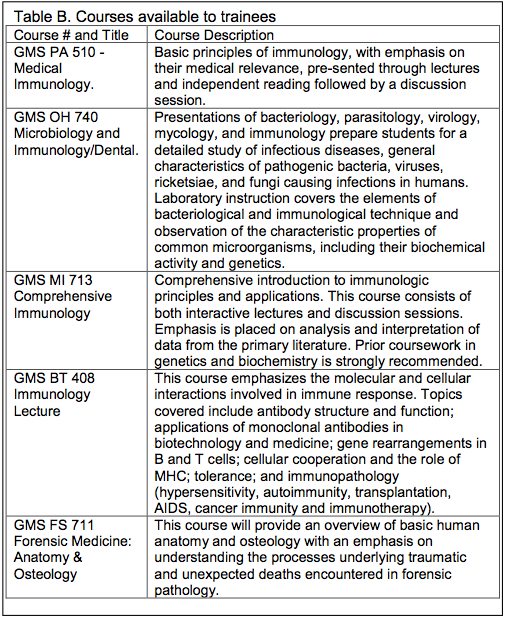Training Curriculum in the Immunobiology of Trauma
Training Curriculum in the Immunobiology of Trauma
The primary purpose of this training grant is to provide an appropriate educational experience to prepare the future generation of physician scientists and biomedical researchers. The most critical aspect to accomplish this goal is to establish a close relationship between the mentor and the trainee. In our experience postdoctoral fellows fail to be academically successful if they do not have appropriate interactions with their mentor. We are fully aware that the purpose of the training grant is not to provide advanced level clinical training, but rather to allow the fellow to become steeped in the academic pursuit of knowledge. Toward this end, the executive committee is primarily comprised of academic leaders with a proven track record of providing exactly the type of mentoring we envision for this training grant. Although the M.D. fellows may have limited exposure to basic science research we will not require that all fellows attend a canned series of didactic lectures or courses. Instead, the training for each fellow will be individualized based on her/his past education and the project that they are studying.
A wealth of courses are offered by the Division of Graduate Medical Sciences at Boston University School of Medicine that are available for advanced training, and a representative sampling is provided in Table B.
The Pulmonary Center at Boston University School of Medicine has a Summer Lung Cell Biology Course which will be made available to all M.D. postdoctoral trainees. This program has operated for more than 15 years and has always been accessible to other departments and programs at Boston University. The topics begin with DNA, RNA and proteins to provide a refresher, basic science introduction. Traditional areas of instruction include cell and organ systems, biostatistics, genetics and genomics, epidemiology and translational research. These lectures are presented in the morning. Lunch is provided and presentations are made by potential research mentors. In the afternoon laboratory exercises are given since many of the M.D. trainees will have had limited hands-on laboratory experience. Even those with extensive prior experience, such as M.D./Ph.D.’s, would benefit from a brief refresher since laboratory techniques rapidly evolve in today’s environment.
Training conferences
Attendance at two groups of conferences will be required for each trainee. The first set of conferences is those specific for the department/program where the fellow is training. Each of the labs participates in a department with a defined seminar series and the fellow will attend these conferences. This is done to ensure that the fellow is fully integrated into the mentor’s program. For example, we have a seminar series in the Department of Pathology and Laboratory Medicine with over 20 outside speakers each year. When the speakers come to town, they have lunch with the current graduate students, residents and fellows in the department to discuss their work and other aspects of life in academic medicine.
The numerous seminar series by each of the departments and programs provide a wealth of opportunities for the trainees to interact with prominent scientists from throughout the world. We will not devote space to detailing the individual seminars, but an example may be found of the series in pathology at the following website http://www.bumc.bu.edu/Dept/Events.aspx?DepartmentID=63 It should be noted that this seminar series is supported by the Department of Pathology from Medical School funds rather than training grant funds to allow us to stretch the grant dollars further.
The second set of conferences will be devoted specifically to the fellows in the training grant, and attendance will be required for each fellow supported by funds from the training grant. These conferences will be open to all interested researchers within the Boston area as advertised widely on the appropriate electronic bulletin boards.
These conferences will take place four times per year and will be an opportunity for the fellows to interact on a regular basis. The Department of Surgery sponsors an annual Clowes visiting professorship which is an all day event devoted to trauma with an outside speaker. Attendance and presentation at the Clowes Visiting Professor Day will be one of the four required conferences. Past speakers have included Ronald Maier, M.D., Professor of Surgery at the University of Washington as well as other notable physicians.
Training program evaluation
Each of the faculty will be given the NIH guidelines for mentoring, which includes such important guidelines as the mentor being readily available for questions and consultation, the mentor must work closely with the trainee for preparation of oral presentations as well as the preparation of abstracts and papers, and there should be, at a minimum, annual evaluation of the trainee. The trainees will also receive the guidelines for the trainees, which may be more important than the guidelines for the mentors. The trainees are a vulnerable position and may not fully 
appreciate the expectations on the
part of the program for the close
supervision by the mentors. Listed
among the responsibilities of the
trainees in the guidelines is the
expectation that the trainees initiate a
meeting with their mentor at least
once every two weeks, trainees must
be aware of the legal and ethical
requirements for their research
(which will be provided in the
responsible conduct of research
seminars), and the need to clearly
communicate their expectations to
their mentor for their research
training.
The survey instruments will be distributed and collected prior to the start of the training, so that the trainees will have a clear understanding of their expectations. The trainees will retain a copy of the survey instrument to keep. The surveys will then be collected at the end of each year of training and the results analyzed by the executive committee.